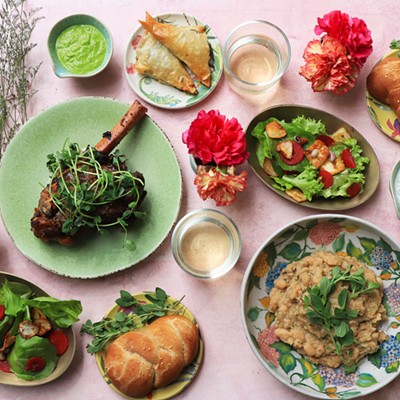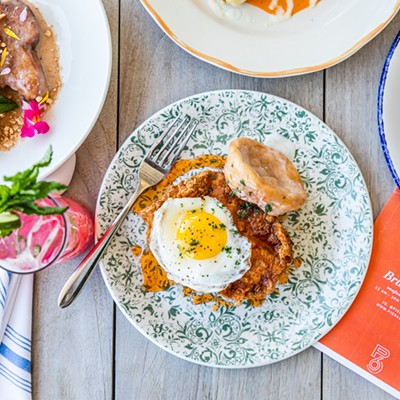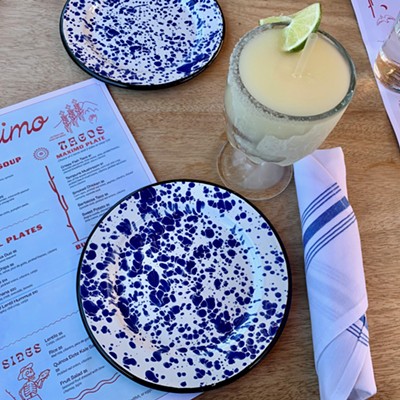Jay Rascoe, J.R. Cohen and Dan Joyce are all familiar faces in Houston's social media community. Rascoe, best known for his food blog, Guns and Tacos, is even a bit of a food celebrity. And these three men are hoping to pool their brainpower and cash in on their cache for a noble cause: saving Houston's food trucks.
The plight of Houston's mobile food vendors, the frequency with which they get shut down and the difficulty in obtaining the proper licences and certificates has long been a topic of conversation both on Eating Our Words and in the larger food community. Austin is frequently cited as an example of what many Houstonians hope to emulate: a relatively free and open market for taco trucks and food stands, where many have even grouped together in permanent "trailer parks" to offer group seating and restrooms while people enjoy a range of to-go foods in the great outdoors. But so far, Houston's health code and various other laws have made this nearly impossible here.
In response to a greater public demand for food trucks and out of a sense of civic responsibility, the trio started Save Our Food Trucks, a non-profit organization devoted to assisting food truck owners work with the City of Houston in countering what are considered by many to be to counter excessive and prohibitive regulations.
As Rascoe put it when I met up with the group on Thursday to eat lunch at the new No Borders truck on Washington: "A while back, we started seeing that when [the City] increased its regulations with the commissaries, a lot of trucks went out of business. There's a whole graveyard of these trucks off the Irvington and Fulton area. It's where taco trucks go to die."
"Those regulations were put in place by some of the bigger groups and restaurant owners in town, and there wasn't anybody to defend the food trucks," he continued. "You don't have any larger group to provide unity and support, and that's what we're trying to do. Strength in numbers."
"Sort of like a lobby?" I asked.
Cohen demurred. "I think a great word is an 'alliance,' to unify all the great food vendors -- both trucks and stands -- together," he responded. "Working together with the city, not against the city to change the regulations, clean up the commissaries and also get the bar owners involved in this, because the two work hand-in-hand." If they aren't serving food, Cohen says, "being able to incorporate a local food truck with their operation is fantastic. We've seen it for years at West Alabama Ice House and with new bars like Liberty Station."
"The ability to eat something that's really good while you're drinking keeps you longer at the bar, so it works both ways." But does that encourage more drinking and therefore more possibility of impaired drivers hitting the road after staying longer at those bars? Rascoe doesn't think so: "It's better to have a full stomach," he replied. "And protein absorbs a lot of the alcohol," added Cohen.
"Recently, through different complaints, some trucks have been shut down by the City or have had to pay lots of fines for things like..." Rascoe trails off as he gestures to the cornflower blue truck parked across the street.
"Right here is the ideal location for the No Borders truck because you can't have seating within 100 feet of the truck, which is a pretty ridiculous rule. I don't see any logic to it at all. But at the same time, you have to have a bathroom within 500 yards. So they've found this great location where they can have that--" he pointed at Urban Living, where No Borders has reached an agreement with the real estate company to use its patio and restrooms, "but you have to have a notarized statement from the business saying that you can use their bathrooms. It makes it really restrictive."
Seating and restroom restrictions aren't the only things the group would like to see changed.
Chimed in Joyce: "We all know that Houston is not a walking city, as much as we wish it was. But there are two areas that are walkable -- downtown and the Medical Center. The use of propane trucks is prohibited downtown, however. The regulation was originally put in place as a part of Homeland Security after 9/11, but the Houston Fire Department continues to enforce it. That's an example of something we're looking to work with, to allow food trucks to operate in these higher foot traffic areas."
"Food trucks are much of a destination now as going to a restaurant. If they're able to post up in areas where people are already out and about, it provides them more visibility that way." It's a complaint that was echoed by Jason Jones, former owner of the now-defunct Haute Texan Tacos truck that eventually had to decamp to Midtown before shutting down entirely.





